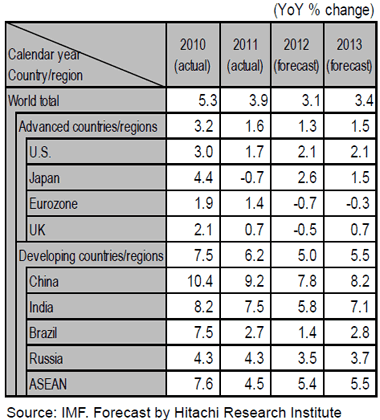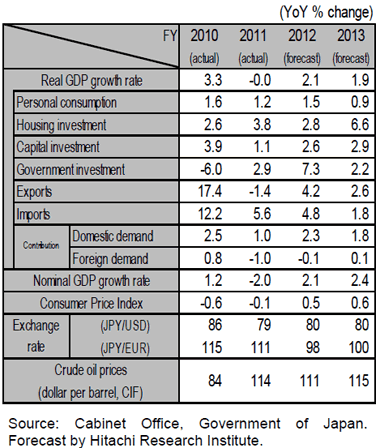Latest economic forecasts for Japan, the U.S., Europe, and China, etc
The global economic situation has become more serious. Due to the prolonged European sovereign debt crisis, global exports to Europe continue to decrease and production has stagnated. In addition, the flow of money around the world has also shifted from the Southern European countries to Japan, U.S., and Germany, and contracted at the same time. Recently, the impact of the European sovereign debt crisis on emerging countries has become notable. In particular, excessive domestic facilities in the Chinese economy have been exposed by the decrease in exports to Europe, which in turn has generated a global easing in supply and demand for iron and steel and basic materials, etc. the status of China’s economy as the World’s Factory has reached a turning point. For this reason, global restructuring is urgently progressing in some industries. On the other hand, the unduly pessimistic view of the U.S. economy has receded, although recovery remains weak. In Japan as well, production has hit a wall due to a decrease in exports. In addition, grain market prices rose sharply because of climatic abnormalities around the world and have become a difficult new issue.
Furthermore, although expectations for additional easing by financial authorities in each country have increased, effective measures have not yet been taken. The global economy is on the brink of the first recession since the economic crisis.
In economies still suffering from the aftermath of rapid growth as described above, financial policies with a long-range perspective that are not so extremely austere as to suppress growth are important. However, uncertainty surrounding the political direction of each country runs deep.
In Europe, the epicenter of the crisis, although the direction for easing fiscal austerity was agreed upon, progress has been slow in taking shape. Furthermore, the stabilization of financial markets and agreement on financial integration are far from being realized. There is a possibility that the actual economy will further deteriorate in the meantime, and the challenge of maintaining the euro may face a dangerous phase this fall.
In the U.S., the economy will be the focus of the presidential election on November 6. In addition, if the “Fiscal Cliff” of tax cuts, etc. set to expire at the end of 2012 cannot be avoided, fiscal austerity will become a reality and the U.S. economy will fall into recession in 2013. Although we forecast that the “Fiscal Cliff” will be avoided, it is necessary to keep in mind that unexpected occurrences could result from the elections in both Houses, as well as the U.S. presidential election.
In Japan, the government enacted a bill to increase Japan’s consumption tax and showed its willingness to maintain fiscal discipline. Although market disruption was avoided, governmental incompetence followed afterwards. Political ferment is expected to continue even after the snap general election anticipated this autumn. Amidst the mountainous pile of challenges such as the energy policy and TPP, “Politics that cannot reach a decision” is a serious risk to the Japanese economy.
In the economies of emerging countries as well, the ability to manage one’s economy in a deepening downturn will be tested. In particular, China, which will see a substantial power shift this autumn, is facing difficulties in shifting its economic structure. A suitable financial system tailored to its economic development and a proactive financial policy will be important. The economic policies of the new administration are awaited with anticipation.
The 2012 real GDP growth rate for the global economy described above is 3.1%, which is the same as our previous forecast. The U.S. economy stands at 2.1% while the EU is -0.7%, and while our view of both these real GPD growth rates is unchanged, our forecast for the economies of the emerging countries is downwardly revised from our previous forecast by 0.1% to 5.0%. China is 7.8%, India is 5.8%, Brazil is 1.4%, and the real GDP growth rates were also respectively downwardly revised.
n the Japanese economy, production activity has stagnated due to the decrease in exports. However, domestic demand is brisk from earthquake reconstruction related public investment and capital investment related to disaster prevention, as well as the Feed-in Tariff. The household economy is also expected to be healthy due to last-minute demand before the consumption tax increase and an increase in consumption by senior citizens. Within this backdrop of brisk domestic demand, foreign direct investment will see a significant increase this fiscal year as well and restructuring to a global production system will progress. Deflation in the 2013 fiscal year is predicted to be nearing an end.
The 2012 real GDP growth rate for Japan is downwardly revised by 0.1% to 2.1%. The exchange rate is forecast to be 80 yen/dollar, 98 yen/euro and 118 yen/pound, while the price of crude oil (CIF) is expected to be 111 dollar/barrel.

